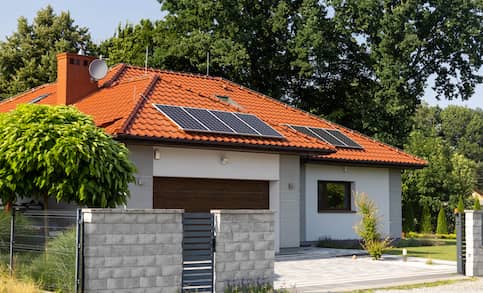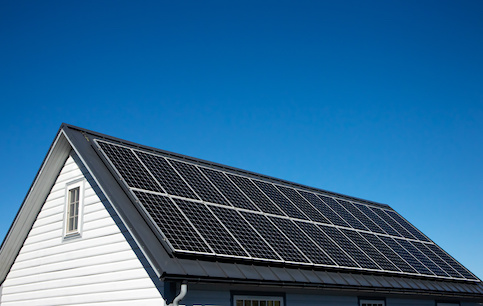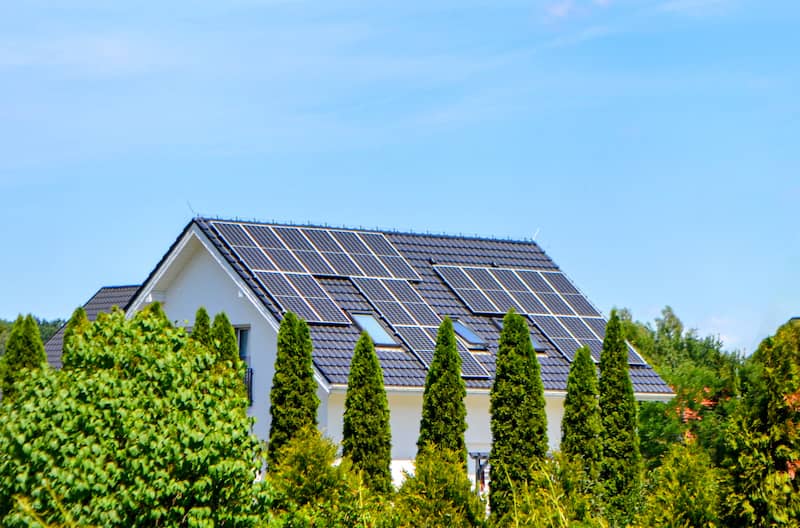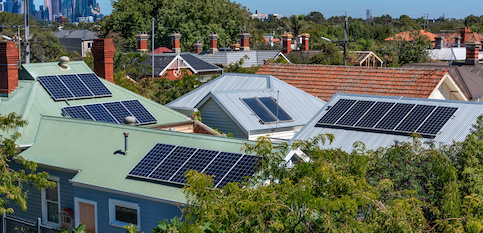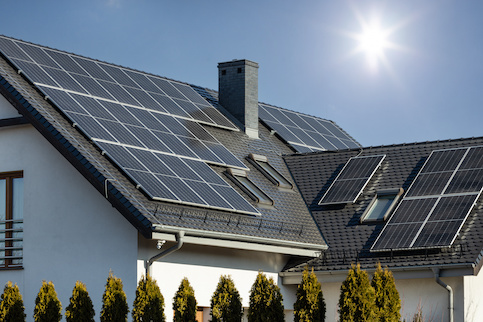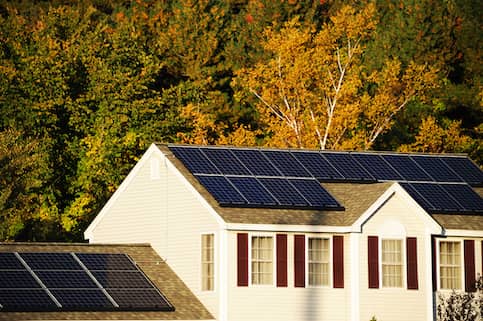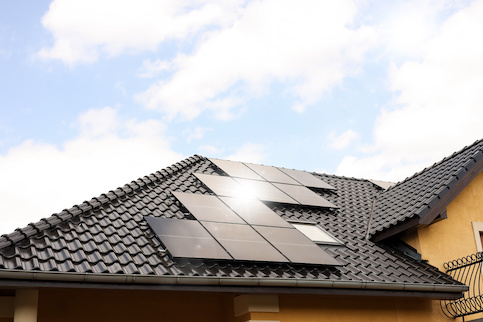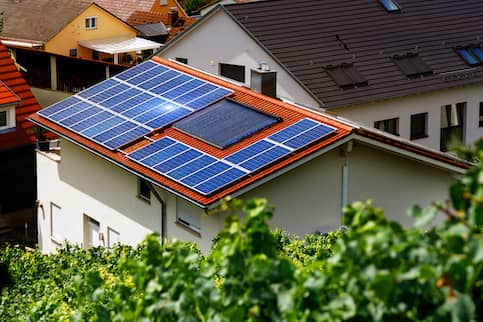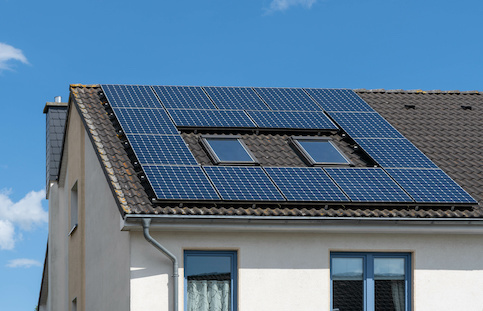Solar Panel ROI: Are Solar Panels Worth The Investment?
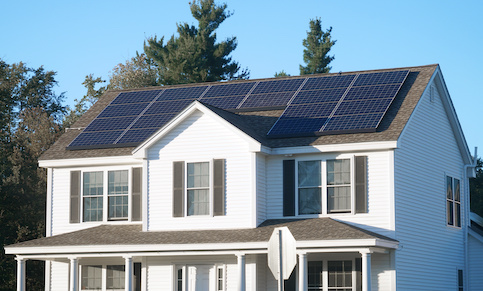
Have you ever attempted to calculate the return on investment (ROI) of an item before you purchase it? The same idea applies before you purchase solar panels. Finding solar panel ROI may help you determine whether they are the right investment for your particular situation.
We’ll take a look at whether solar panels save you money, the factors that affect solar panel ROI and how to calculate solar ROI.
Find A Mortgage Today and Lock In Your Rate!
Get matched with a lender that will work for your financial situation.
What Is The Return On Investment (ROI) For Solar Panels?
You can calculate the solar panel return on investment by dividing the profit earned on an investment by the cost of the investment. It’s worth calculating the cost of installing solar panels – your solar payback period helps you understand how much you’ll be able to make up for your initial solar energy investment.
Ultimately, installing solar panels is worth the investment – there are a few benefits of getting solar panels, including an ability to reduce your utility bills, increase your home value, allow you to take advantage of incentives, help you avoid future rate increases, reduce your environmental impact, fuel your home during power outages and stabilize the grid.
How Do Solar Panels Save You Money?
What are the costs associated with installing solar panels? They typically cost $16,000 on average but can cost between $3,500 – $35,000, depending on the type of panels you choose. However, homeowners can save money or break even on a solar panel investment by net metering and taking advantage of tax incentives.
- Electricity bill savings: Put simply, you’ll save money on your electricity bill with solar panels because you become less reliant on the grid. This means your utility company will not send you a bill as often, if at all, depending on your setup.
- Net metering: Net metering can save you money or help you break even on your solar panel investment. Net metering means that you sell the electricity you don’t use back to the grid. Your utility company will compensate you for the excess electricity.
- Solar tax incentives: Tax incentives can help save you money or break even on your solar panel investment. You can receive a 30% tax credit for installing a photovoltaic system between 2022 and 2032, a 26% tax credit in 2033 and 22% in 2034 through the Federal Tax Credit for Solar Photovoltaics.
See What You Qualify For
Home Purchase
Home Refinance
Tap Into Equity
What Factors Affect Solar Panel ROI?
Costs and other considerations can impact solar panel return on investment. Let’s take a look at installation costs, inspection fees and permits, maintenance and repair costs as well as sun exposure, weather conditions and panel orientation.
Installation Costs
The average cost of installing solar panels depends on a few factors, but the average upfront cost of a 6 kW system is about $16,620 before incentives. These upfront installation costs can affect solar panel ROI because it is the figure that serves as the foundation for your ROI calculation.
Inspection Fees And Permits
You may pay residential roof-mounted Inspection fees and permits when getting solar panels installed on a house. These fees can affect solar panel ROI because they go into the overall cost of calculating your ROI. You can look into your county’s planning and developmental services.
The costs of permits for residential solar systems (such as an electrical permit, structural or building permit and/or a dedicated PV permit). It may add a couple hundred dollars to your overall costs.
Maintenance And Repair Costs
The average costs to maintain or repair a solar system typically cost about $150 per year, which involves cleaning and overall maintenance. These costs should factor in order to help you figure out your actual ROI.
Sun Exposure, Weather Conditions And Panel Orientation
Sun exposure, shade, weather conditions and the orientation of solar panels can affect solar system efficiency. Solar panels generally work at peak efficiency between 59 degrees and 95 degrees Fahrenheit. In addition, they also work best when placed on a south-facing roof and tilted between 30 and 45 degrees.
The amount of shade in the area can also affect your panels’ efficiency. For example, if you have a lot of tall pines surrounding your home, your panels may not be that efficient. The efficiency of your solar system can affect your overall ROI.
How To Calculate Your Solar ROI
As a solar investor, you can calculate payback time using three simple calculations:
- (Cost of solar panels) x (0.30 tax credit) = Savings after applying tax credit
- (Cost of solar panels) – (Savings after applying tax credit) = Initial investment
- Initial investment/Amount you pay your energy company per year = Payback period
For example, let’s say your solar panel will cost $25,000 to install, including any fees and permits. Multiply this amount by 0.30, the amount of the tax credit you will receive:
$25,000 x 0.30 = $7,500
Subtract the savings after applying your tax credit from the cost of the solar panels to get your total initial investment:
$25,000 – $7,500 = $17,500
Next, take your initial investment and divide by the amount you normally pay your energy company per year to determine the payback period. In this case, let’s say you normally spent $1,200 per year on your electricity.
$17,500/$1,200 = 14.6 years
In this case, the result is a payback period of 14.6 years. This may seem like a long period of time, but remember that solar panels typically last 25 years.
What Is The Average Solar Panel ROI?
The average ROI for solar panels in the U.S. is about 10%, but this varies depending on the location of your solar panels, your home and other factors. You can use a ROI calculator to determine the ROI for your specific solar panel setup.
What Is The Average Solar Panel Payback Period?
When will you recoup the initial costs of having solar panels installed on a house? It usually takes between 5 – 15 years to get your initial investment back, depending on where you live, the price you paid for them, the cost of electricity from your utility company and incentives you can get from making the investment.
Solar Panel ROI FAQs
How much money does having solar panels save every month?
The average 6 kW solar panel can save the average household about $1,500 per year, or about $125 per month. This average depends on the specifics of your particular situation, including sun exposure, weather conditions and panel orientation.
How do I maximize my solar panel ROI?
You can maximize your solar panel ROI by taking advantage of the federal tax credits put in place right now. Installing solar panels in an area with the most sunlight possible can also help maximize your ROI. Finally, performing energy intensive activities such as running the dishwasher or HVAC system during the day will also help lift your ROI.
Are solar panels worth the investment?
Yes, solar panels are worth the investment as long as you do your due diligence to calculate your costs ahead of time, understand the incentives, ROI and payback period. It’s also worth considering whether you’ll be able to sell excess power back to the power company. Some states and companies allow this.
Do solar panels add value to my house?
Yes, generally, solar panels add value to a home. Homes with solar panels sell for approximately 4.1% more than homes that don’t have solar panels, according to Zillow. On a $400,000 house, this amounts to an extra $16,400
However, this also depends on the market. In certain areas, homes may have a much larger markup than homes in other areas of the country. For example, in the New York City metro area, homes offer a 5.4% return with solar panels.
The Bottom Line
Renewable energy offers many potential benefits, including environmental benefits, reducing utility bills, incentives, avoiding future rate increases and reducing your environmental impact.
You can calculate your payback period and also get the total ROI. If you can sell excess energy back to the grid, your system could end up making you money. Solar panels typically take 5 – 15 years to pay for themselves, but they last up to 25 years. On top of that, they add significant value to your home.
Find A Mortgage Today and Lock In Your Rate!
Get matched with a lender that will work for your financial situation.
